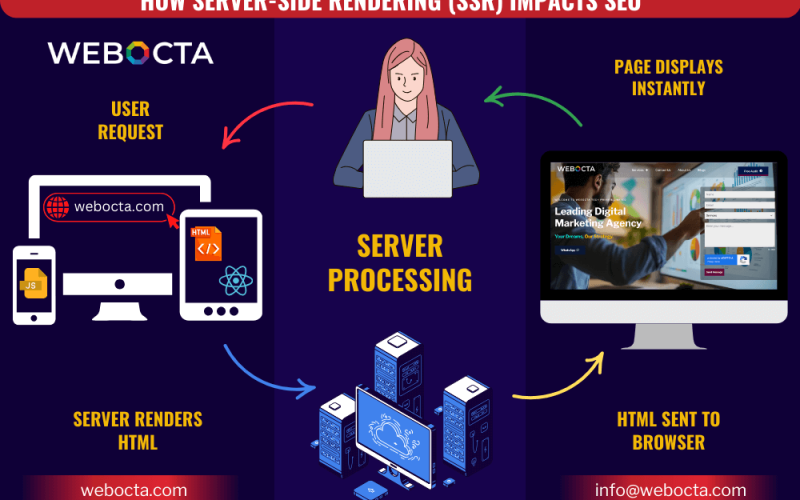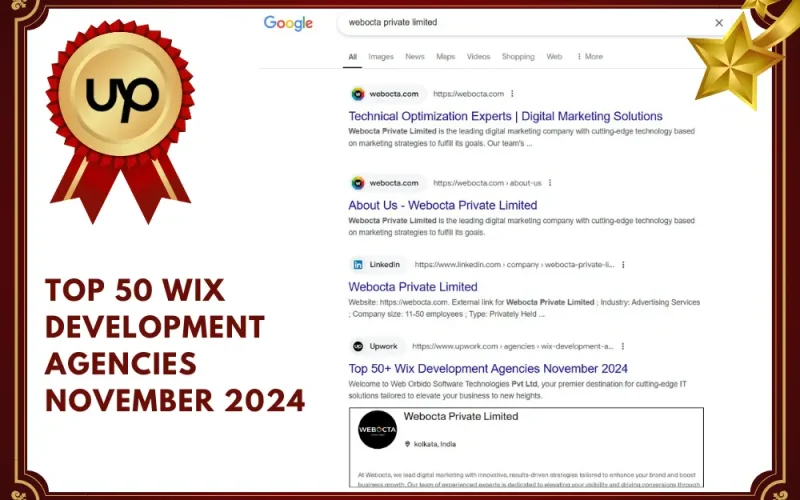In the digital space, foremost activities in achieving success remains website performance. The use of Content Delivery Networks (CDN) s highly impacts website speed, which user experience, and SEO rankings. As Webocta Tech Private Limited SEO services and website optimization experts, businesses stand to gain competitive advantage.
What is a Content Delivery Network (CDN)?
A system of globally dispersed servers for hastening the delivery of website content is known as a CDN. Instead of depending solely on one server, a CDN saves cached editions of specific webpages onto numerous servers, significantly decreasing page loading time. It also improves SEO effectiveness which improves positions in search engines.
How does CDN Works?
By storing a website’s data on multiple servers that are spread across a wide geography, a CDN enhances the speed and effectiveness of the website. With this method, a user is first directed to the closest server, which results in lesser lag time as well as shortened loading periods. This also results in improved security, endurance and performance of the website.
- Edge Server: strategically positioned near populations so they can easily retrieve and deliver cached content.
- Load Balancing: works towards equally distributing the received traffic to minimize the chances of a single server getting too much demand.
- Minimized Data Travel: Reducing the distance that the data needs to actually travel in order to enhance better speed.
The Role of a CDN in SEO Optimization
Search engines favor websites that load swiftly. A Content Delivery Network (CDN) influences SEO negatively or positively in a number of ways.
- Increases Page Speed: The faster a website loads, the easier it is for users to find it, especially when making a search inquiry.
- Boosts Core Web Vitals Performance: Google has its unique set of ranking factors that include things like: Largest Contentful Paint (LCP), First Input Delay (FID), and Cumulative Layout Shift (CLS). With a CDN, these numbers are good and maintained.
- Lessens Server Load: A CDN avoids single server crashes and downtime by dispersing traffic among different servers.
- Enables Better UX: When bounce rates are low due to a website being faster, engagement and conversion rates increase.
- Increases Mobile SEO: A CDN boosts performance on mobile devices, which is necessary to ensure any rank at all.
- Improves Security: Trust ratings of a site increase because a CDN prevents Distributed Denial of Service (DDoS) attacks.
- Expands Reach: A CDN helps businesses grow internationally by ensuring they perform at a high level everywhere.
CDNs and Website Caching: An Overlap in Focus Areas
Website caching allows for frequent data access to provide quick page loads. A Content Delivery Network (CDN) improves store caching by utilizing:
- Cutting down on bandwidth waste
- Cutting Back on Time to First Byte (TTFB)
- Rapid delivery of static assets like images, scripts, and stylesheets
Different Types of Website Caching Implemented by CDNs
- Browser Caching: Holds components of the website on a user’s device, enhancing retrieval time.
- Server Caching: Minimizes database look ups, enhancing the speed of dynamic content.
- Edge Caching: Retains information on the nearest CDN server for swift retrieval.
The benefits of continuity in performance leads to improved page load times and SEO rating.
Core Web Vitals, CDN and the Synergy In between:
Google’s Core Web Vitals greatly impacts SEO, which is secured by a CDN optimizing these vitals:
- Lowering latency via remote servers
- Boosting load rendering with efficient content caching.
- Upholding stability by blocking any content shifts.
Dissection of Core Web Vitals:
- Largest Cuntentful Paint (LCP): Measures how quickly the main component of the page is displayed. A CDN can assist with this due to their available resources being readily optimized.
- First Input Delay (FID): Measures the time when the user tries to interact with the page. A faster server response tends to be ensured by a CDN, enabling smooth user experience.
- Cumulative Layout Shift (CLS): Measures loss of visual stability. A CDN mitigates unexpected layout shifts by controlling how the content is displayed.
Top tier performance and search ranking is achievable for businesses bringing in Webocta Tech Private Limited due to their expertise in CDN integration.
Extra Advantages Of A CDN
- Decreased Cost of Bandwidth: A CDN reduces hosting costs by caching and compressing files, which minimizes bandwidth usage.
- Improved Security on the Website: A CDN offers an extra layer of security against cyber attacks while protecting user data from breaches.
- Better Performance of Video Streaming Playback: For sites that have videos, a CDN enables smooth playback by reducing buffering and enhancing delivery speed.
- CNDs Scalability Configuration for High Volume Ideas: A CDN can accommodate traffic surges without any loss of efficiency so that websites remain functional even during peak periods.
CDN Integration With Webocta Tech Private Limited
Webocta Tech Private Limited is one of the top providers of digital marketing services, helping businesses integrate Content Delivery Networks (CDN) for optimal performance. The integration is important for all types of online businesses, be it an e-commerce store, an information blog, or a service-based digital platform.
How Webocta CDN Configuration Assistance Features
- CDN Implementation and Configuration
- Traffic Performance Analysis and Optimization
- Important Changes Related to SEO
- New protection against cyber threats security changes
- Website performance problems while supporting throughout the day
Final Thoughts: CDN and Website Performance Support
This type of network is increasingly important for modern SEO as it provides a competitive edge by reducing page load times, caching, and optimizing Core Web Vitals. Implementing a Content Delivery Network (CDN) is by far the best option.
















